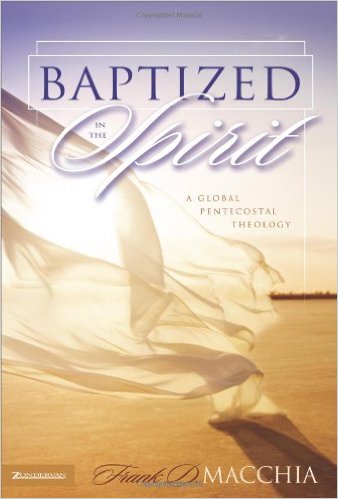 Chapter Three: The Kingdom and the Power
Chapter Three: The Kingdom and the Power
In this chapter Macchia redefines Spirit-baptism to more broadly incorporate initatory, sacramental and Pentecostal concerns. Spirit-baptism is a matter of Christian initiation, a divine act of new life through the gospel, but it cannot be limited to this. Grace is not a “deposit” received, but initiation into a new relationship with a living Lord—the Spirit. The presence of the Spirit is nurtured and opened out sacramentally and in new experiences or “releases” of the Spirit for sanctification and empowerment towards witnessing for Christ. Spirit-baptism transcends personal, individual and ecclesial concerns for it is oriented toward the eschatological kingdom of God.
Macchia departs somewhat from the classic Pentecostal “second-blessing” theology to argue that Spirit-baptism occurs at conversion as part of the gospel promise and proclamation, and its reception by the believer in faith. He also distinguishes his position from that of Karl Barth and James Dunn who limit Spirit-baptism to the work of God in conversion, and retain water baptism as human response to divine grace and a symbol of that faith and repentance. Rather, Macchia argues that (a) the symbol participates in the reality symbolised, so that water baptism is both a divine and a human act by which we participate in the reality symbolised, and (b) that the eschatological nature of Spirit-baptism means it cannot be limited to Christian initiation, but opens up to ever-renewed participation in the missio Dei and thus new gifts and experiences (64-72). The Holy Spirit does use and is mediated via the sacraments, but as the free and living Spirit, is not tied to them.
There is no question but that the witness of Acts is not just about how the Spirit brings one to faith in Christ or seals that commitment in baptism. There is something more than a hidden mystery to be affirmed by faith at work in this narrative, but also the fulfillment of faith through inspired witness and the confirmation of faith in signs of the new creation in Christ. … Pentecostals do well to highlight the empowerment for prophetic witness in their understanding of Spirit baptism. They focus not on one’s initial conversion to Christ but on becoming the church for the world (75, 76).
Macchia acknowledges the practical concern that Pentecostals have
to preserve the need for Christians to seek a definite work of the Spirit in their lives that will give them experiences analogous to those described in the book of Acts. They feel that without a “Spirit baptism” to be sought among Christians, the Lukan experience of empowered witness accompanied by a proliferation of extraordinary spiritual gifts could be lost to the churches (78).
However he is critical of the reductionist way in which early Pentecostals distinguished sanctification from empowerment.
The bottom line is that Spirit baptism as an experience of charismatic power and enrichment cannot be separated from regeneration/sanctification and Christian initiation. The experience of Spirit baptism is inseparable from its broader pneumatological framework in the constitution of the church and the fulfillment of the kingdom of God. Spirit baptism in Pentecostal experience is a “release” of the Spirit in life for concrete experiences of consecration and charismatic enrichment/power (84).
Thus Macchia will allow some element of “subsequence” with respect to the Christian’s experience of the Spirit (in accordance with the classic Pentecostal position), but not “separation.” It is worth noting, however, that he does not use this language. Rather, by appealing to the eschatological nature of Spirit-baptism, and to the notion of participation, he suggests an ongoing encounter with the Spirit in the life of the church and the believer in which,
The experience of new life in faith, hope, and love in the context of the gospel, the sacraments, and the Pentecostal experience of prophetic consecration (with charismatic signs following) allows one to participate already in a Spirit baptism that is yet to come. It is always present and coming, emerging and encountering (87).